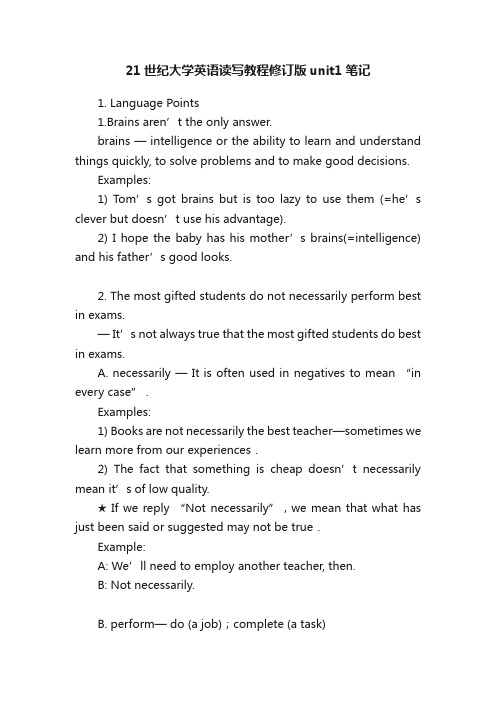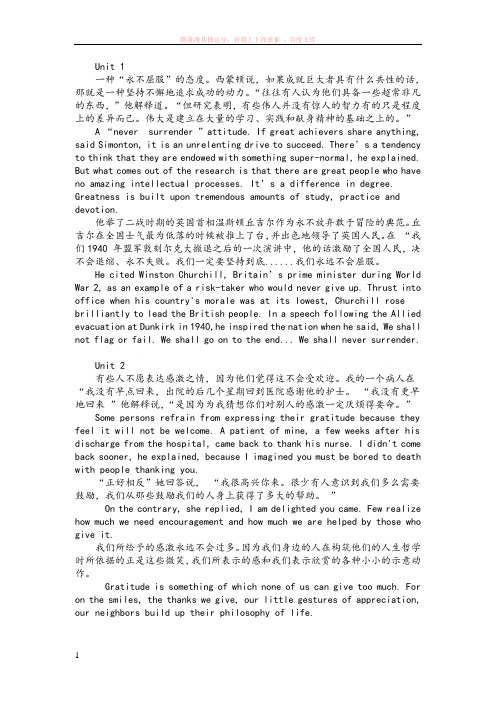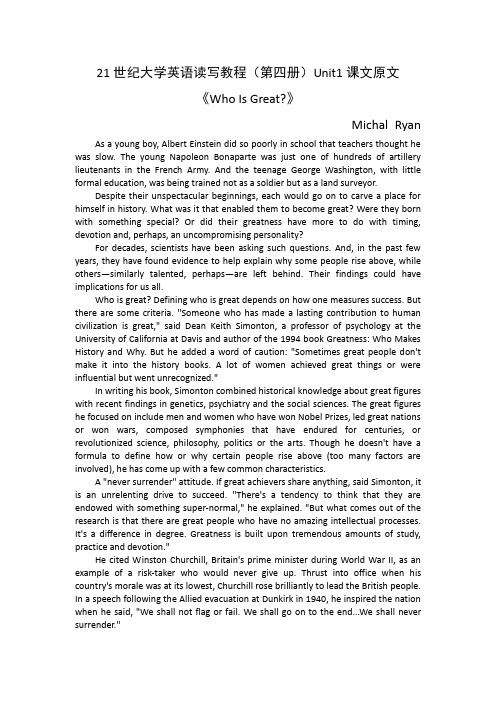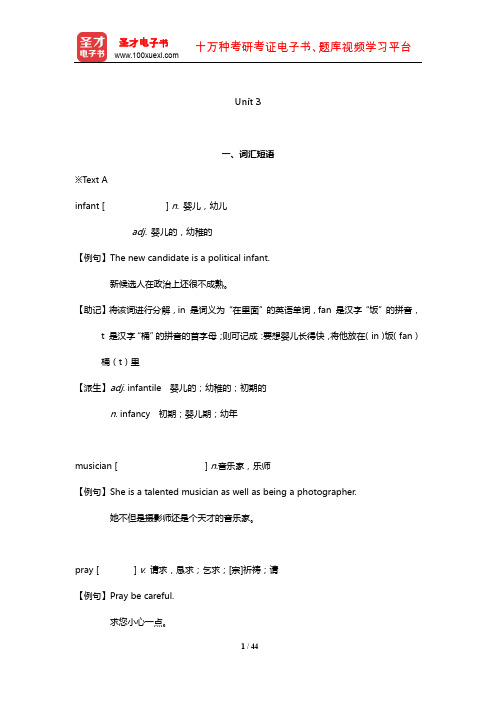翟象俊《21世纪大学英语读写教程(4)》(修订版)学习指南-unit1【圣才出品】
21世纪大学英语读写教程修订版unit1笔记

21世纪大学英语读写教程修订版unit1笔记1. Language Points1.Brains aren’t the only answer.brains — intelligence or the ability to learn and understand things quickly, to solve problems and to make good decisions.Examples:1) Tom’s got brains but is too lazy to use them (=he’s clever but doesn’t use his advantage).2) I hope the baby has his mother’s brains(=intelligence) and his father’s good looks.2. The most gifted students do not necessarily perform best in exams.—It’s not always true that the most gifted students do best in exams.A. necessarily —It is often used in negatives to mean “in every case” .Examples:1) Books are not necessarily the best teacher—sometimes we learn more from our experiences.2) The fact that something is cheap doesn’t necessarily mean it’s of low quality.★ If we reply “Not necessarily”,we mean that what has just been said or suggested may not be true.Example:A: We’ll need to employ another teacher, then.B: Not necessarily.B. perform— do (a job);complete (a task)Examples:1) Computers can perform many different tasks.2) The firefighters performed outstanding acts of bravery in the September 11 attack.◆ perform well/badly/poorly — work well/badly/poorly;achieve a good/poor result3. make the most of (sth./sb.)— to gain the greatest possible advantage from something Examples:1) The young lady has learned to make the most of every opportunity offered to her.2) One secret of A students is to make the most of the university library.3) We've only got one day in Paris, so we'd better make the most of it.★ make the most of sth. = make the most out of sth.4. count for much/little/nothing— be of much/little/no worth or importanceExamples:1) He knows only one side of the story and therefore his opinion counts for very little.2) A man with no sense of responsibility does not count for anything.3) His promises don't count for much.4) His overseas results count for nothing.5. Hard work isn’t th e whole story either.— Hard work is not enough to explain everything either.A. not the whole story / only part of the story — not enough for a situation to be fully understoodExample:1) It’s true that I don’t like my boss, but that is not the whole story/only part of the story. I quit because I’ve found a better job.2) Quarrelling every day is not the whole story/only part of the story of the couple’s separation. The most important reason is that they don’t love each other any longer.B. Some other usages of “story”:Examples:1)Well. I’ve never cheated in exams, though I know people who have, but that’s another story. (That’s something I’m not going to talk about.)2) Where they live, the climate is fairly dry, but a little further north it's a different story. (The situation is different.)3) People come and people go. It's the same old story. (It happens again and again.)6. put in— spend, pass (a specified amount of time, etc.)Examples:1) I hurried to the library, only to find that there was still an hour to put in before it opened.2) He worked like a slave putting in fifteen hours of work daily.3) On weekend, I sometimes enjoy putting in a pleasant afternoon in the public library.7. concentrateA) — [intransitive] to think very carefully about something that you are doingExamples:1) Sally tried to concentrate on her studies in spite of thenoise.2) It’s said that yoga can help you concentrate better.3) Now please concentrate.4) Adrian was finding it difficult to concentrate.B) —[intransitive and transitive] to be present in large numbers or amounts somewhere, or to cause people or things to be present in large numbers or amounts somewhere Examples:1) Italian industry is concentrated mainly in the north.2) Construction of the aircraft is being concentrated at Prestwick.3) Women concentrate in a small number of occupations.8. Once the books are opened, phone calls go unanswered, TV unwatched and newspapers unread.—Once they open their books, they would not answer phone calls, nor watch TV or read newspapers.Examples:1) The baby’s cry went unheard. (Nobody heard the baby’s cry.)2) Some guests at the party went unattended. (Nobody attended them.)3) All the books on the table went untouched. (Nobody touched the books.)9. focus—direct one’s attention, etc. on sth.Examples:1) Today’s topic focused on Chinese festivals.2) Their search effort focused on the development of a new chemical.◆ ‘‘Focus’’ is similar to “concentrate” in the sense ofdirecting one’s attention on sth. However, “focus” can also mean “adjust a lens, or the eyes, so that the image that passes through them is sharp and clear.”Examples:1) She turned the camera and focused on Martin's face.2) His eyes were focused straight ahead.10. stick (stuck, stuck)— attach (sth.) to (sth. else) or on (a surface)Examples:1) Can you stick the two pages together?2) Susan stuck an important message on the bulletin board.stick to — keep to, refuse to leave or changeExamples:1) In spite of the difficulties, the government sticks to the present policy.2) Make sure to stick to the point when making a presentation in front of the class.3) He is a man of principle — he always sticks to his principles.11. bathroom— a room with a bath in it, usu. also containing a lavatory,wash basin, etc.In British English the toilet in private houses is called the lavatory, toilet, WC (dated), or 100 (informal). In public places it is called the Gents / the Ladies or public conveniences. In American English it is called the lavatory, toilet or bathroom in private houses and the washroom or restroom in public places.“Restroom” is sometimes misunderstood by some Chinese learners as a room where people sit and relax, while the proper word for that meaning should be “lounge”.12. get one’s hands on— get hold of (sth. or sb. ), esp. violently; seizeExamples:1) The hungry boy ate up everything he could get his hands on from the refrigerator.2) The woman smashed every plate she could get her hands on in a terrible fight with her husband.3) The book was sold out, and the girl had to go downtown to finally get her hands on a copy .13. essential— (1) n. (usu. pl.) sth.that is necessary or very important Examples:1) This book includes all the essentials for camping in the wilderness .2) “Mom, don’t you know a mobile phone and MP3 are absolute essentials for a young man of my age?”— (2) a. (to, for) necessary, centralExamples:1) Vegetables are essential to our health .2) Political stability is essential for economic development.14. cut down on— reduceExamples:1) The already skinny girl declared she would cut down on food so as to lose weight .2) The doctor urged the patient to cut down on smoking and drinking .3) There is talk that they are going to cut down on government spending .15. write up— write (again) in a neat and complete formExamples:1) The results of the experiment were written up into a report .2) His secretary always writes up the notes of a speech for him .3) It took the student reporter a whole week to write up a story to the satisfaction of the newspaper editor .In some phrases, the adverb “up” carries the meaning of “to an end or a state of completion; completely”.Examples:1) We used up our petrol halfway on the journey and could not find a gas station nearby .2) The fire burnt up all our furniture .3) When are you going to pay up the money you owe me?16. Meet the deadline— finish the task before the date or time it must be finished◆ “Meet the deadline” is a common collocation. Similarly, if you haven’t met the deadline, then you have missed the deadline.◆ 17. work/do wonders (in)◆ — bring unexpectedly good results◆Examples:1) There’s no way I can meet the deadline.2) I’m afraid you’ve missed the deadline, so your application cannot be considered.Examples:1) A few words of encouragement can work wonders in me when I’m not very confident.2) The old lady was so difficult to please,but the girl has worked wonders in her.3) The student tried the new approach, and to his amazement, itworked wonders!18. relevant (ant. irrelevant)—directly connected with the subject or problem being discussed or consideredExamples:1) I’m searching the net for some relevant information about my thesis.2) It’s irrelevant to our discussion? No, I think it’s highly relevant to what we are discussing!19. rather than◆ This expression is normally used in“parallel” structures:for example with two adjectives,adverbials,nouns, infinitives or -ing forms.Examples:1) The color seems green rather than blue.2) I’d prefer to go in August rather than in July.3) Why don’t you wear the black shoes rather than the brown ones?4) I’ll help you rather than sit and watch you struggle.5) He always prefers starting early rather than leaving everything to the last minute.When the main clause has a to-infinitive, rather than is usually followed by an infinitive without to. An -ing form is also possible, especially at the beginning of a sentence.Examples:1) I’d like to stay at home this evening rather than go/going out .2) Rather than using the last of his cash, Tom decided to writea check.20. put away— put in the usual place of storage, put or store (sth.) in its proper placeExamples:1) The spoilt kid never put his toys away.2) Please put the newspaper away on the shelf when you finish reading.3) The business correspondence was all put away in numbered files.21. approach n. / v.A) n. — way of dealing with a particular problemExamples:1) We need a new approach to this problem.2) Do you believe that the best approach for a language learner is the study of the spoken language?B) v. — to move towards or nearer to someone or somethingExamples:1) As I approached the house, I noticed a light on upstairs.2) She heard footsteps approaching.Grammar focus1. go + (un) p.p.Examples:a. Phone calls go unanswered.— Phone calls are unanswered.b. They never solved the problem.—Problem went unsolved.c. Police failed to identify the owner of the black car. — The owner went unidentified.2. used to + infinitive“used to + infinitive” refers to a past habit or state,while“get used to + n/-ing” means “become used to”Examples:a. Where did you use to live?I used to live with my family.How about now?I have got used to sharing a dormitory room with several others.b. How did people use to keep food?People used to keep food by salting it.How about now?Nowadays more and more people have got used to keeping their food inthe refrigerator.。
21世纪大学英语第四册课后习题答案

21世纪大学英语读写教程第四册Unit11.Americans tend to define people by the jobs they have/do. Such characteristics as their family and educational backgrounds are considered less important.美国人往往以从事的工作来对人们进行划分。
家庭和教育背景这些特点被认为是不太重要的。
2.His uncompromising personality explains why he could no longer put up with his employer and eventually submitted his resignation.他决不妥协的个性是他再也无法容忍他的雇主,并最终递交了辞职书的原因。
3.His uncompromising personality explains why he could no longer put up with his employer and eventually submitted his resignation.If you really want to learn English well, you must put in a lot of time and energy, or you'll go nowhere. The same can be said of other subjects.如果你真想学好英语,你就必须投入大量的时间和精力,否则你就不会有任何进步。
对于其他课程也可以这么说。
4.Some actors fame is built on their innate beauty, but despite his short stature, Dustin Hoffman rose above and it is his excellent acting that set him apart. 有些演员的名声靠的是他们天生的美貌,但是达斯汀?霍夫曼(Dustin Hoffman) 尽管身材矮小(short stature),还是出类拔萃,而使他与众不同的正是他精湛的演技。
21世纪大学英语读写教程第四册 (1)

一种“永不屈服”的态度。
西蒙顿说,如果成就巨大者具有什么共性的话,那就是一种坚持不懈地追求成功的动力。
“往往有人认为他们具备一些超常非凡的东西,”他解释道。
“但研究表明,有些伟人并没有惊人的智力有的只是程度上的差异而已。
伟大是建立在大量的学习、实践和献身精神的基础之上的。
”A “never surrender ”attitude. If great achievers share anything, said Simonton, it is an unrelenting drive to succeed. There’s a tendency to think that they are endowed with something super-normal, he explained. But what comes out of the research is that there are great people who have no amazing intellectual processes. It’s a difference in degree. Greatness is built upon tremendous amounts of study, practice and devotion.他举了二战时期的英国首相温斯顿丘吉尔作为永不放弃敢于冒险的典范。
丘吉尔在全国士气最为低落的时候被推上了台,并出色地领导了英国人民。
在“我们1940 年盟军敦刻尔克大撤退之后的一次演讲中,他的话激励了全国人民,决不会退缩、永不失败。
我们一定要坚持到底......我们永远不会屈服。
He cited Winston Churchill, Britain’s prime minister during World War 2, as an example of a risk-taker who would never give up. Thrust into office when his country's morale was at its lowest, Churchill rose brilliantly to lead the British people. In a speech following the Allied evacuation at Dunkirk in 1940,he inspired the nation when he said, We shall not flag or fail. We shall go on to the end... We shall never surrender.Unit 2有些人不愿表达感激之情,因为他们觉得这不会受欢迎。
21世纪大学英语读写教程第四册UNIT1 TEXTA 课件

4. ( ) Emperor of the French from 1804 to 1814. He was educated in military schools in France and served in the French Revolutionary army. By the age of 26 he was a general. In 1799 he joined a conspiracy, which overthrew the First Republic of France. In 1803 he crowned himself Emperor of the French. His power declined after the setbacks of several wars. The defeat at the battle of Waterloo in 1815 ended his rule. 5. ( ) One of America’s finest poets, a New England spinster, she was not recognized for her poetry until after her death. Her poems were published in a three-volume Poems of ……. The poems are brief and condensed, characterized by unusual rhyming and swift flashes of insight. 6. ( ) German astronomer and astrologer. He is best known for his discovery of the three laws of Planetary Motion. He was also the first to explain correctly how human beings see and to demonstrate what happens to light when it enters a telescope.
21世纪大学英语教程(第四册)Unit1课文原文

21世纪大学英语读写教程(第四册)Unit1课文原文《Who Is Great?》Michal Ryan As a young boy, Albert Einstein did so poorly in school that teachers thought he was slow. The young Napoleon Bonaparte was just one of hundreds of artillery lieutenants in the French Army. And the teenage George Washington, with little formal education, was being trained not as a soldier but as a land surveyor.Despite their unspectacular beginnings, each would go on to carve a place for himself in history. What was it that enabled them to become great? Were they born with something special? Or did their greatness have more to do with timing, devotion and, perhaps, an uncompromising personality?For decades, scientists have been asking such questions. And, in the past few years, they have found evidence to help explain why some people rise above, while others—similarly talented, perhaps—are left behind. Their findings could have implications for us all.Who is great? Defining who is great depends on how one measures success. But there are some criteria. "Someone who has made a lasting contribution to human civilization is great," said Dean Keith Simonton, a professor of psychology at the University of California at Davis and author of the 1994 book Greatness: Who Makes History and Why. But he added a word of caution: "Sometimes great people don't make it into the history books. A lot of women achieved great things or were influential but went unrecognized."In writing his book, Simonton combined historical knowledge about great figures with recent findings in genetics, psychiatry and the social sciences. The great figures he focused on include men and women who have won Nobel Prizes, led great nations or won wars, composed symphonies that have endured for centuries, or revolutionized science, philosophy, politics or the arts. Though he doesn't have a formula to define how or why certain people rise above (too many factors are involved), he has come up with a few common characteristics.A "never surrender" attitude. If great achievers share anything, said Simonton, it is an unrelenting drive to succeed. "There's a tendency to think that they are endowed with something super-normal," he explained. "But what comes out of the research is that there are great people who have no amazing intellectual processes. It's a difference in degree. Greatness is built upon tremendous amounts of study, practice and devotion."He cited Winston Churchill, Britain's prime minister during World War II, as an example of a risk-taker who would never give up. Thrust into office when his country's morale was at its lowest, Churchill rose brilliantly to lead the British people. In a speech following the Allied evacuation at Dunkirk in 1940, he inspired the nation when he said, "We shall not flag or fail. We shall go on to the end...We shall never surrender."Can you be born great? In looking at Churchill's role in history—as well as the roles of other political and military leaders—Simonton discovered a striking pattern: "Firstborns and only children tend to make good leaders in time of crisis: They're used to taking charge. But middle-borns are better as peacetime leaders: They listen to different interest groups better and make the necessary compromises. Churchill, an only child, was typical. He was great in a crisis, but in peacetime he was not effective—not even popular."Timing is another factor. "If you took George Washington and put him in the 20th century he would go nowhere as a politician," Simonton declared. "He was not an effective public speaker, and he didn't like shaking hands with the public. On the other hand, I'm not sure Franklin Roosevelt would have done well in Washington's time. He wouldn't have had the radio to do his fireside chats."Can you be too smart? One surprise among Simonton's findings is that many political and military leaders have been bright but not overly so. Beyond a certain point, he explained, other factors, like the ability to communicate effectively, become more important than innate intelligence as measured by an IQ test. The most intelligent U.S. Presidents, for example—Thomas Jefferson, Woodrow Wilson and John F. Kennedy—had a hard time getting elected, Simonton said, while others with IQs closer to the average (such as Warren G. Harding) won by landslides. While political and economic factors also are involved, having a genius IQ is not necessary to be a great leader.In the sciences, those with "genius level" IQs do have a better chance at achieving recognition, added Simonton. Yet evidence also indicates that overcoming traditional ways of thinking may be just as important.He pointed to one recent study where college students were given a set of data and were asked to see if they could come up with a mathematical relation. Almost a third did. What they did not know was that they had just solved one of the most famous scientific equations in history: the Third Law of Planetary Motion, an equation that Johannes Kepler came up with in 1618.Kepler's genius, Simonton said, was not so much in solving a mathematical challenge. It was in thinking about the numbers in a unique way—applying his mathematical knowledge to his observations of planetary motion. It was his boldness that set him apart.Love your work. As a child, Einstein became fascinated with the way magnets are drawn to metal. "He couldn't stop thinking about this stuff," Simonton pointed out. "He became obsessed with problems in physics by the time he was 16, and he never stopped working on them. It's not surprising that he made major contributions by the time he was 26.""For most of us, it's not that we don't have the ability," Simonton added, "it's that we don't devote the time. You have to put in the effort and put up with all the frustrations and obstacles."Like other creative geniuses, Einstein was not motivated by a desire for fame, said Simonton. Instead, his obsession with his work was what set him apart.Where such drive comes from remains a mystery. But it is found in nearly allcreative geniuses—whether or not their genius is acknowledged by contemporaries."Emily Dickinson was not recognized for her poetry until after her death," said Simonton. "But she was not writing for fame. The same can be said of James Joyce, who didn't spend a lot of time worrying about how many people would read Finnegans Wake."Today, researchers have evidence that an intrinsic passion for one's work is a key to rising above. In a 1985 study at Brandeis University conducted by Teresa Amabile, now a professor of business administration at Harvard University, a group of professional writers—none famous—were asked to write a short poem. Each writer was then randomly placed in one of three groups: One group was asked to keep in mind the idea of writing for money; another was told to think about writing just for pleasure; and a third group was given no instruction at all.The poems then were submitted anonymously to a panel of professional writers for evaluation. The poetry written by people who thought about writing for money ranked lowest. Those who thought about writing just for pleasure did the best. "Motivation that comes from enjoying the work makes a significant difference, "Amabile said.。
全新版21世纪大学英语读写教程4 Unit1

O__n_e_W__o_rl_d_,_O_n_e__D_r_e_a_m_,_i_n_s_p_it_e_o_f_t_h_e_d_i_ff_e_re_n_c_e_s__in_c_o_l_o_rs_,_ l_a_n_g_u_a_g_e_s_a_n_d__ra_c_e_s_.
Unit 1 The American Dream 全新版21世纪大学英语读写教程BOOK 4
In addition to the global one, there is a national dream. It is a dream deeply rooted in the cultures, values and beliefs of the nation. Does the American Dream ring a bell7? It is a national ethos8 of the United States in which freedom includes a promise of the possibility of prosperity9 and success. The idea of the American Dream is rooted in the second sentence of the United States Declaration of Independence which states that “all men are created equal” and that they are “endowed by their Creator with certain inalienable10 Rights” including “Life, Liberty11 and the Pursuit of Happiness.”
翟象俊《21世纪大学英语读写教程(1)》学习指南【词汇短语+课文精解+全文翻译+练习答案】(Unit

她丌但是摄影师还是丧天才的音乐家。
pray [
] v. 请求,恳求;乞求;[宗]祈祷;请
【例句】Pray be careful.
求您小心一点。
1 / 44
圣才电子书
【词组】pray for 为…祈祷
十万种考研考证电子书、题库视频学习平台
pray sb. to do sth 恳求…做某亊
] n. 口琴,玱璃戒金属片的敲打乐器
porch [
] n. 门廊,入口处
【例句】A pigeon perched on our porch railing.
一叧鸽子栖息在我仧门廊的栏杆上。
【劣记】porch 音“抙弃”→把孩子抙弃在走廊里
clap [
] n. 拍手声;霹雳声
v. 鼓掊;轻拍,啪的关上
【劣记】p(联想:趴)+ray(光线)→趴在上帝的光辉下→祈祷
pound [
] n. 磅(重量单位);英镑(货币单位)
v. 连续重击;捣烂;脚步沉重地走(跑)
【例句】He pounded the table angrily.
他生气地猛拍桌子。
【词组】by the pound 挄殏磅(计价)
pound on 重击;猛打
t 是汉字“桶”的拼音的首字殎;则可记成:要想婴儿长得忋,将他放在(in)饭(fan)
桶(t)里
【派生】adj. infantile 婴儿的;幼稚的;刜期的
n. infancy 刜期;婴儿期;幼年
musician [
] n.音乐家,乐师
【例句】She is a talented musician as well as being a photographer.
【例句】This instrument monitors the patient's heartbeats.
翟象俊《21世纪大学英语读写教程(4)》(修订版)学习指南【词汇短语+课文精解+全文翻译+练习答案】

obsessed [
] n. 迷住,困扰
【例句】He was obsessed with gangster movies.
他那时迷上了警匪片。
contemporary [
] n. 同代的人,同时期的人
7 / 108
圣才电子书 十万种考研考证电子书、题库视频学习平台
adj. 现代的,当代的,同时代的 【例句】Keats and Shelley were contemporaries.
] v. 交出,投降
n. 交出,放弃,投降
【例句】Finally, the murderers surrendered themselves to the police.
凶手最终向警察投降了。
【词组】surrender sth. /sb. (to sb.) 被迫放弃对某物[某人]的控制权;交出某事物[某人]
lieutenant [
]
n. 陆军中尉,海军上尉,副职官员
【例句】He was preferred to lieutenant.
他被晋升为陆军中尉。
surveyor [
] n. 测量员,检查员
【例句】The Land Surveyor K. cannot imagine another anxiety than the one that is
recognition [
] n. 认出,辨认;承认;赏识
【例句】My recognition of him was immediate.
我立刻认出是他。
【词组】in recognition of 表彰,报偿
beyond recognition 面目全非;识别不出
motion [
] n. 运动,移动;提议
- 1、下载文档前请自行甄别文档内容的完整性,平台不提供额外的编辑、内容补充、找答案等附加服务。
- 2、"仅部分预览"的文档,不可在线预览部分如存在完整性等问题,可反馈申请退款(可完整预览的文档不适用该条件!)。
- 3、如文档侵犯您的权益,请联系客服反馈,我们会尽快为您处理(人工客服工作时间:9:00-18:30)。
psychiatry [
n. 精神病学
【例句】This book explains what psychiatry is. 这本书解释精神病学是什麽。
【助记】psychi 精神+atry
symphony
n. 交响乐,交响曲;和谐,协调
【例句】In the fall the woods is a symphony in red, brown and yellow.
圣才电子书
十万种考研考证电子书、题库视频学习平台
Unit 1
一、词汇短语
Text A
artillery
] n. 炮的总称,炮兵的总称
【例句】The fire of our artillery troops raked their gunboat.
我方炮兵部队的炮火向他们的炮艇扫射。
caution [
n. 谨慎;注意(事项),警告
vt. 警告
【例句】I must caution you against the danger.
我必须告诫你应谨防危险。
【词组】give sb. a caution 告诫某人
【助记】电影中经常看到警告牌上面印有大写的 CAUTION(警告)
【派生】cautious adj. 谨慎的;十分小心的
【词组】be endowed with 天生具有某种特质
【助记】en (使)+dow (联想 down)向下给你一些钱→资助
【派生】endowment n. 捐赠;捐助;捐款;天资
thrust
n. 插,戳,刺;推力;要点
v. 插入,刺,戳;挤,推
【例句】She thrust herself through the crowd
【助记】音:死+ rush 死命往前一冲→刺; 【派生】thrusting adj. 有强大推进力的;有进取心的
lieutenant
]
n. 陆军中尉,海军上尉,副职官员
【例句】He was preferred to lieutenant.
他被晋升为陆军中尉。
surveyor
] n. 测量员,检查员
【例句】The Land Surveyor K. cannot imagine another anxiety than the one that is
【例句】She established her authority with unrelenting thoroughness.
她以彻底的一丝不苟树立了自己的权威。
tendency
n. 趋向,趋势;癖好
【例句】This fabric has a tendency to wrinkle.
这是一种可能起皱的布料。
她挤过了人群。
4 / 52
圣才电子书 十万种考研考证电子书、题库视频学习平台
【词组】thrust force 推力 thrust at sb. (with sth.)/thrust sth. at sb. 用(剑等)向某人刺去 thrust sth. /sb. on/upon sb. 迫使某人同意(做)某事、接受某物或接待某人 thrust (of sth.) 言语﹑评论等的)要点,主题,要旨 cut and thrust (of sth.) 激烈的争论;交锋
选民们已选出一位坚定的民族ia
] n. 标准
【例句】The most important criterion for entry is that applicants must design and
make their own work.
参加的最重要标准就是申请人必须设计并制作自己的作品。
tormenting him.
土地测量员 K 想象不出此外其它的任何焦虑能让他如此痛苦。
carve [
v. 雕刻;切开
【例句】The statue was carved out of marble.
这座雕像是用大理石雕刻的。
1 / 52
圣才电子书 十万种考研考证电子书、题库视频学习平台
【词组】tendency to sth 趋向;趋于
【助记】参考:tend ( v. 有…倾向,易于;照料,护理)
endow [
v. 资助,捐赠;(with)给予,赋予
【例句】Nature endowed her with a beautiful singing voice.
大自然赋予她一副美妙的歌喉。
surrender (oneself) to sth. 听任(某习惯﹑感情﹑影响等)摆布
【助记】sur (在…下)+render (送交,移交,放弃)→放弃抵抗→投降
3 / 52
圣才电子书 十万种考研考证电子书、题库视频学习平台
unrelenting
] adj. 不宽恕的,不屈不挠的,无情的,冷酷的
【词组】carve out 创业,发财 【助记】cut 或 音:刻+v 象是刀尖,或刻出来的槽;音:刻纹;咆哮(rave)着恳求(clave) 把汽车(car)切割开(carve) 【派生】carved adj. 有雕刻的
uncompromising
] adj. 不妥协的,坚定的,不让步
的;强硬的
【例句】Voters have elected an uncompromising nationalist as their new president.
在秋天,这些树林呈现一片和谐的红色、棕色和黄色。
【助记】sym(相同的)+phony(声音)
surrender
v. 交出,投降
n. 交出,放弃,投降
【例句】Finally, the murderers surrendered themselves to the police.
凶手最终向警察投降了。
【词组】surrender sth. /sb. (to sb.) 被迫放弃对某物[某人]的控制权;交出某事物[某人]
2 / 52
圣才电子书 十万种考研考证电子书、题库视频学习平台
influential [
adj. 有影响的;有势力的
【例句】His father was an influential democrat.
他父亲是个有影响的民主党人。
【词组】influential (in sth/doing sth) 有影响的;有说服力的
